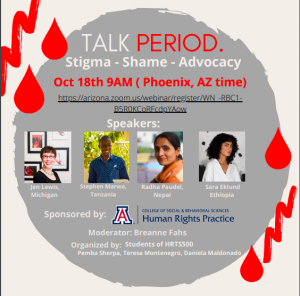Menstrual Activism

According to the Global Health Council “on a given day more than 800 million women and girls between the ages of 15 and 49 menstruate anywhere from 2-7 days” . Although Menstruation is normal and an integral part of life, it is seen as a mark of shame. Something that is told not to be openly discussed because talking about periods has become a taboo subject in our society. According to the United Nations Population Fund, “shame, stigma, and misinformation surrounding menstruation are contributing to serious human rights concern for women and girls worldwide”. Due to cultural practices, religious beliefs, social myths, and lack of knowledge, menstruation has become a huge educational, medical and emotional barrier. Advocates and organizations globally are fighting to ensure that the stigma placed on menstruation is removed so that women and girls are not prevented from reaching their fullest potential due to the shame, silence and lack of access.
The purpose of this webinar was to give a voice to menstruation activists globally that have established their own practices to fight against menstruation stigma and shame. Our goal was to have speakers share their own methods that they’ve found to best address this issue and also share what obstacles or methods have not worked for them in the past. This would allow others to join the movement globally, connect and share ideas to further progress the movement towards abolishing harmful practices and empowering individuals to break the cycle of shame.
Participants:
Radha Paudel, Nepal. Founder of Global South Coalition for Dignified Menstruation (GSCDM)
Jen Lewis, United States. Founder of Beauty in Blood
Sara Eklund, Ethiopia. Founder at Noble Cup
Stephen Marwa, Tanzania. Executive Director of Hope Revival Children Organization
Questions discussed:
1) Why did you choose Menstruation Advocacy, what do your advocacy methods entail? 2) What is menstruation advocacy according to each panelist and Why do they believe this is a human rights question?
3) How did you all overcome personal shame and stigma toward the topic? Or were you always open minded about it?
4)Biggest obstacles? How to get through to people that are not open to having these conversations and see menstruation as a taboo topic?
5) How do you include trans men in the conversation and how would you advocate for them and their rights, when it comes to menstruation?
6) Will we achieve our goal like SDGs (sustainable development goals) by the way we are doing so far today?
7) Why are the menstrual taboos, abuses, restrictions and discrimination not counted as Sexual and Gender Based Violence as defined by the UN?
8) Are we ready to change our narratives on menstrual activism?
Recording of Webinar:
https://drive.google.com/file/d/1Q-puYTPGGgOK71SjrvL5bn50VksT00g9/view?usp=drive_web

